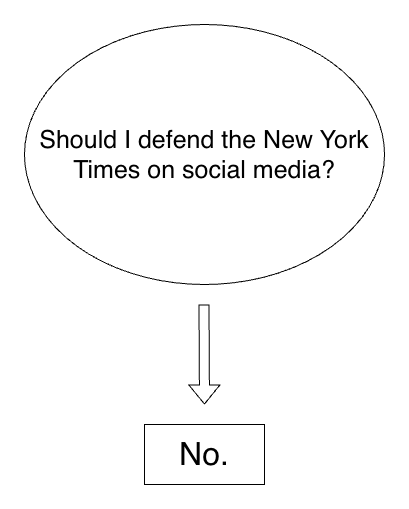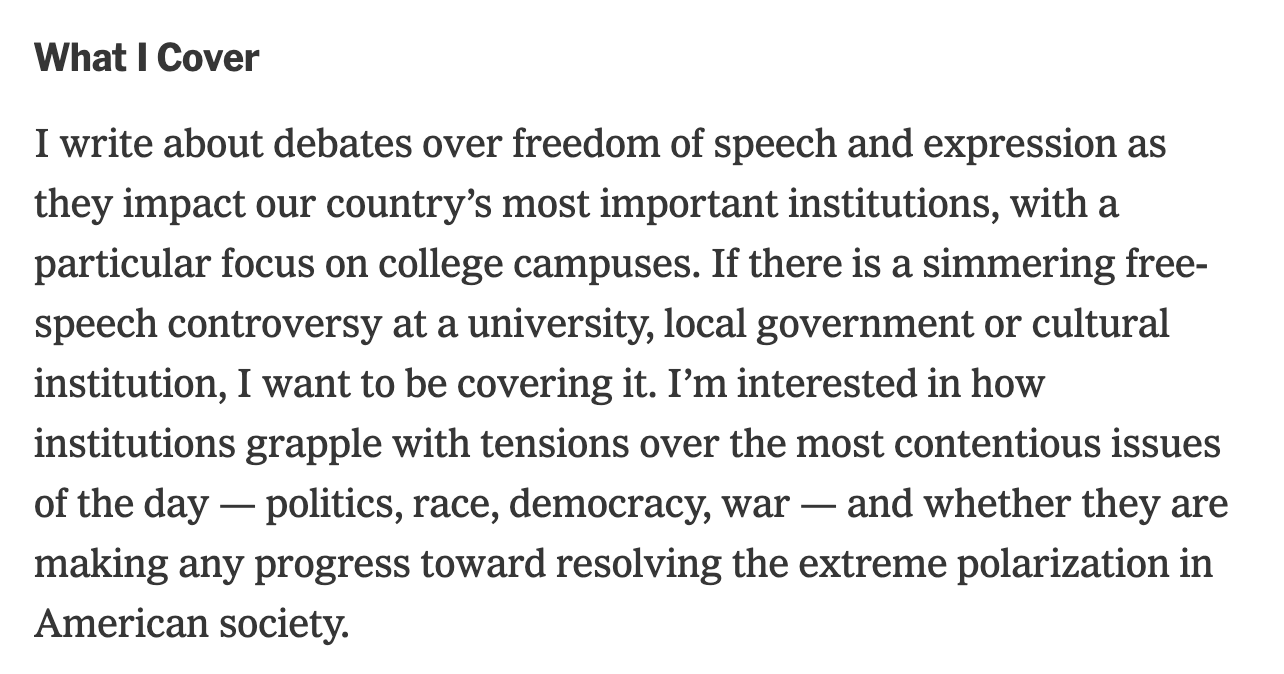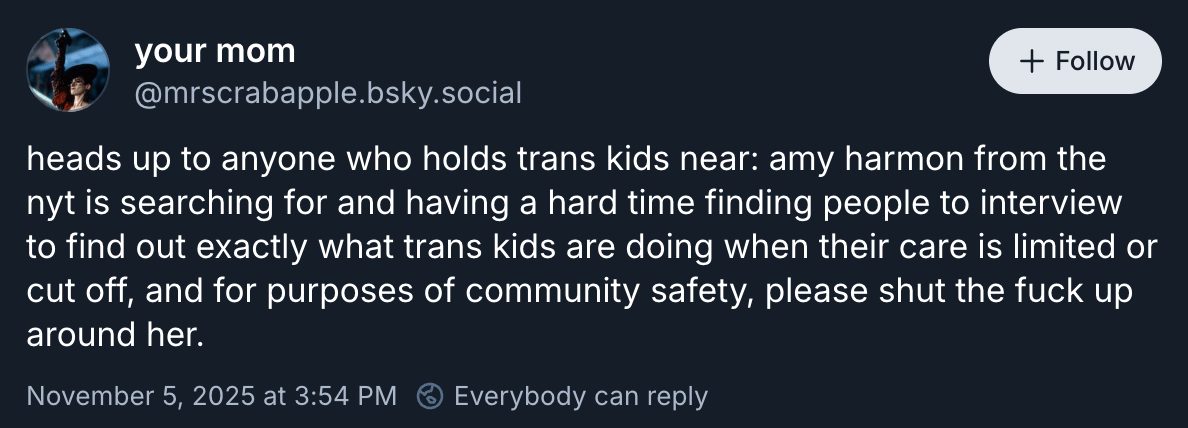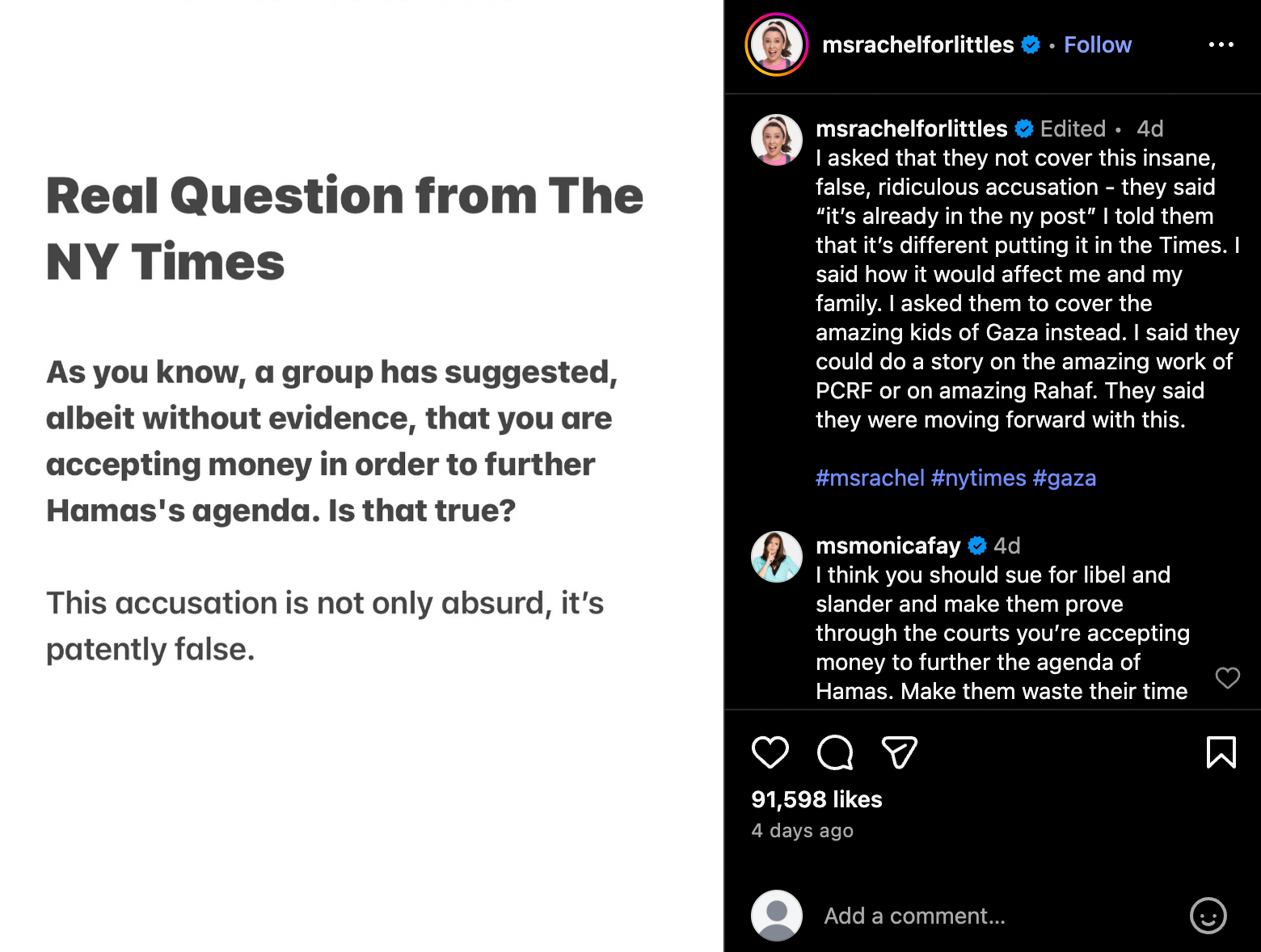- Today in Tabs
- Posts
- No One Trusts The New York Times
No One Trusts The New York Times
Is this a problem?
Is it a problem that no one trusts the New York Times?
In Lit Hub, former Bowdoin College Africana Studies chair Peter Coviello wrote a piece titled “Maybe Don’t Talk to the New York Times About Zohran Mamdani,” in which Coviello is approached by a reporter who “seemed at least marginally less disreputable” than the others who wanted him to talk about Mamdani—a reporter who “said he was less interested in Mamdani himself than he was in the Africana Studies part.”
And so, after consulting with friends a little more media-seasoned than I, and exchanging some emails with the reporter laying out what I was and wasn’t interested in speaking about, I agreed to an interview. I did this because, in ways you might think I’d have outgrown by now, I’m a fucking idiot.
The reporter was Jeremy Peters, and I’ll give you a moment here to stop laughing. If you’re not laughing yet because you don’t know who Jeremy Peters is, here’s Peters’ beat, in his own words:
Anyone who’s been involved with higher education in America, particularly at the elite level that Bowdoin College inhabits, should already know that no one at the Times whose job is to “cover debates over freedom of speech and expression” on campus can be trusted. It is commendable of Coviello to admit that he was a fucking idiot, so I don’t have to mar my otherwise enthusiastic endorsement of his piece by calling him one myself. But I do strongly recommend that he find some friends who are a lot more media-seasoned than he is, rather than just a little.
And Peters wasn’t even part of the trio of Times reporters who previously collaborated with a well-known Substack eugenicist to report breathlessly that Mamdani had described his ethnicity correctly in an application to Columbia University, which rejected him anyway.
Of course the Times has not been safe for trans people to talk to for quite a while now, and even less so for people who care for trans children. Back in January of 2023, Tom Scocca documented at length what he wrote was “pretty obviously—and yet not obviously enough—a plain old-fashioned newspaper crusade” by the Times against gender affirming care for youth:
Month after month, story after story, the Times is pouring its attention and resources into the message that there is something seriously concerning about the way young people who identify as trans are receiving care. Like the premise that the Clintons had to have been guilty of something serious, or that Saddam Hussein must have had a weapons program worth invading Iraq over, the notion that trans youth present a looming problem is demonstrated to the reader by the sheer volume of coverage. If it's not a problem, why else would it be in the paper?
This was shortly followed by an open letter signed by “nearly 1,000 New York Times contributors, in addition to tens of thousands of subscribers and readers of the Times… condemning the publication’s coverage of transgender, non-binary and gender non-conforming people.” In June of this year, GLAAD reported that nothing has changed:
The New York Times’ coverage of transgender people and issues has been critiqued for years by trans people, the broader LGBTQ community, and allies. Now instead of directly addressing the critiques, meeting with the community harmed by the coverage, or forthrightly fixing its errors in reporting and news gathering, the Times is deploying its most distrusted and discredited reporters in a new project designed to profit off its inaccurate and biased coverage.
Children’s entertainer Ms. Rachel has been in an open feud with the Times for months now, recently posting this to Instagram:
This seems to be a question Times reporter Marc Tracy asked her back in May, for a story in which he ended up writing:
Last month, the advocacy group StopAntisemitism labeled [Ms. Rachel] Accurso the “Antisemite of the Week” and, The New York Post reported, sent a letter urging Attorney General Pam Bondi to investigate whether Accurso is receiving funding to further Hamas’s agenda.
This accusation is so absurd that Defector’s Samer Kalaf had already mocked it thoroughly a month earlier, pointing out that its source is a transparent political propagandist and that her accusations are ridiculous.
The natural reaction would be to categorize [StopAntisemitism’s Liora Rez] as a kook and a failure in all other aspects of life, to ask if next she'll claim that Hamas is concealing a command center underneath Oscar the Grouch's trash can.
But at the Times, Marc Tracy felt compelled to take it seriously enough to ask Ms. Rachel to deny it on the record. After all, as she says in the instagram caption, they told her “it’s already in the ny post.” I have to wonder if that’s the Times standard for newsworthiness across the board?
Then yesterday a new trove of emails were released by the House Oversight Committee from the estate of Jeffrey Epstein (the New York financier). And they are… a lot. Like, a lot a lot. But some people noticed in particular the emails between Epstein and former Times financial correspondent Landon Thomas Jr. The Intercept’s Noah Hurowitz wrote:
In the emails, Thomas tipped off Epstein about inquiries by other reporters and claimed to have vouched for Epstein, whom he said he called “one hell of a guy.” In one exchange, Thomas coached Epstein on how to repair his reputation.
The relationship between Epstein and Thomas has been known since at least 2018, and likely led to Thomas’ dismissal from the newspaper, according to David Folkenflik in 2019. But to many on social media, this was the first we were hearing about it, and some of the details in the newly released emails were quite striking.
Regrettably, Gawker founder and occasional Times freelance contributor Liz Spiers attempted to drag some of the wilder conspiracy theories on Bluesky back toward reality, which went about the way you’d imagine. She was correct to say that Landon Thomas having newsworthy information in his emails from Epstein is not at all the same as the New York Times having that information, in anything but the most technical sense that it existed somewhere on their email servers. Newsrooms are not in the habit of surveilling their reporters’ email accounts, for both editorial and legal reasons, although perhaps when Times editors found themselves firing a reporter for being too cozy with a source they should have bent that guideline a bit. In any case Spiers may have “infinite stamina for arguing with strangers on the internet” but for everyone else, I made a simple flowchart to guide you if you’re ever tempted to defend the New York Times as an institution from online criticism:

For my purposes today, the main thing to notice is how quickly a preponderance of posters were ready to believe that the entire top brass at the Times had colluded to cover up evidence of ties between Epstein and Trump, at virtually the exact same time they were in full 🚨 B U T 🚨 H E R 🚨 E M A I L S 🚨 mode about Hillary Clinton. Because here’s the thing: no one trusts the New York Times.
Now look, pace Spiers here, the Times is an enormous, shambolic, and multifaceted institution. There is no one univocal actor that could be described as “the New York Times.” I myself talked to the Times’ Madison Malone Kircher last month about the death of “going viral,” and I thought the story she wrote was both accurate and interesting, and I didn’t have any concerns that anyone was going to accuse me of being funded by Hamas. But on the other hand, I have trans children in my family and I definitely wouldn’t talk about that with the Times. In fact I didn’t.
There are a number of Times reporters and staff I consider at least friendly acquaintances, and I know some of them are reading this right now, and I also know they probably know all of this better than I do. When I say “no one trusts the Times” I hope they understand I’m being a little hyperbolic, but not all that much. I hope they’re at least as bothered by the question as I am.
But for the rest of us, for American news readers, is it a problem that significant cohorts of the news reading public have good reason to simply not trust that the New York Times will attempt to report the truth? The L.A. Times, CNN, and CBS have been taken over by far right ideologues. The Washington Post just reached the point in its own media organization collapse cycle where it announces it’s giving micropayments a try, which tells me that the decline in real subscriptions is proving sustained and durable. And why wouldn’t it, with the Post running this sort of bullshit in unsigned editorials now?
As reluctant as it might be organizationally to fill this role, the New York Times is one of our last major news organizations that hasn’t yet been fully and overtly captured by the far right. So I think it does matter that for the past decade at least, the newspaper’s credibility has been systematically fed into a wood chipper in the interests of transphobes, eugenicists, campus culture grifters, and the pro-genocide wing of the Zionist movement. I think Times should stop doing that.
In other news: In the Times (where else!) Jacob Bernstein wrote a big, gauzy profile of Olivia Nuzzi and her new book about how she fell in love with the garbage disposal and his sexy fish tank juice habit. It’s not clear whether Bernstein read the book but it is clear he got all hornt up for Nuzzi.
Becca Rothfeld roasted Leah Libresco Sargeant. There are still a few people worth reading left at the Post.
Julie Kliegman in Defector: What Does a Great Trans Athlete Deserve?
Today’s Song: HEALTH, “YOU DIED”
I bet everyone’s going to be extremely normal in response to this essay about the New York Times. If you got something out of it, maybe consider becoming a paid subscriber.




Reply